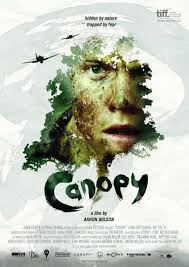
CANOPY
Australia/Singapore, 2013, 84 minutes, Colour.
Khan Chittenden, Tzu-yi Mo.
Directed by Aaron Wilson.
Canopy, in the title, refers to the luxuriant jungle growth outside the city of Singapore. It becomes a protection for an Australian soldier, his parachute caught in a tree and having to cut himself down and make his way through the jungle to escape the Japanese.
The setting is 9th February, 1942, just two months after the bombing of Pearl Harbour. It is surprising to realise how swiftly the Japanese attacked so many of the countries of the Pacific, ranging from China to Australia in those early months of 1942. They took Singapore, occupied it, leading to Winston Churchill’s decision to draw a line at Singapore and not committing any forces to defend below that line. The film opens in darkness, with only sounds, of talking, music, then of explosions and the audience realising what has happened in Singapore.
The Australian soldier has to make choices of what he will carry on his trek through the jungle, relying on a compass. Japanese patrols pass close by him and he is successful in hiding. Then, suddenly, he bumps into another person and the two of them shape up to fight. However, the newcomer is able to explain that he is Chinese and the two bond together, no longer two men alone, lonely in the jungle, trying to survive.
There is pathos in the character of the Chinese, especially when he is wounded and the Australian has to sew his wound, causing great pain to the Chinese.
This is a different story about Singapore and its fall. There was larger scope in such films as A Town like Alice and Paradise Road. This scope is small, over a day or more, two men’s brief experience of war.
There are some moments of dreams, remembering home in Australia, nightmares of what had happened in the jungle, and a sad but hopeful final glimpse of the Australian soldier back home after the war.
Khan Chittenden portrays the soldier. This is Aaron Wilson’s first feature film – illustrating talent and craft, an appeal to an arthouse audience for atmosphere, but multiplex audiences will find it too slow moving for adrenaline tastes.
1. An Australian- Singapore production? Memories of World War II? The fall of Singapore, the experience of war, the Japanese invasion and occupation? Australian involvement? Chinese involvement?
2. The title, the jungle and its growth, covering, protection, assent to the sacred? The vivid visuals of the impact? Musical score?
3. The introduction, 9 February 1942? Black screen, music, voices, the attack, explosions?
4. The man hanging in the tree, his parachute caught, unconscious, awaking, hearing the sounds, cutting himself down, choosing what to save, assessing it, carrying it? The jungle terrain? The mud, the water, the creek, the trees, the opportunity to drink and wash?
5. His trek, hope, the destination, uncertain? With the compass? Hearing the Japanese advance? Hiding? Day and night passing?
6. Bumping into the Chinese, mutual fear, fists, the Chinese indicating who he was, the Australian becoming calm?
7. Company for each other, helping each other, not feeling alone? The Japanese patrols, their falling into the grass, hiding? Offering the chocolate to the Chinese?
8. The attack, the Chinese being wounded, the Australian sewing his wound, the pain, the blood, having to keep silence? Surviving?
9. Finding the dead Chinese, the soldier’s grief?
10. The Japanese, the patrols, on the bikes?
11. Hiding in the tree trunk, Jim dreaming about his wife, standing at the gate, the field? Dreaming of what he had experienced? The Chinese and his dreaming? His putting the hand over Jim’s mouth to silence him? Waking, looking at the Chinese – the close-up?
12. Being captured, the Chinese, his pain, the Japanese, the threat with the gun, his death? Jim and his being dragged on the back of the truck? The transition to the truck on the road in the country? Jim, older, standing with his back to the field, contemplating?
13. The experience of war, survival, friendship? The relevance of this kind of story today?